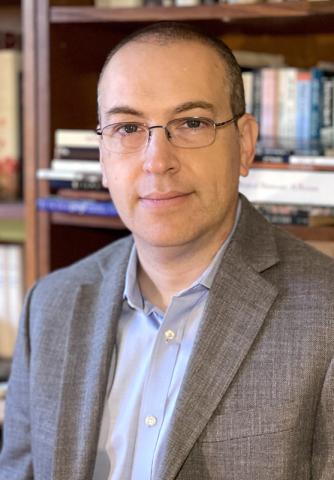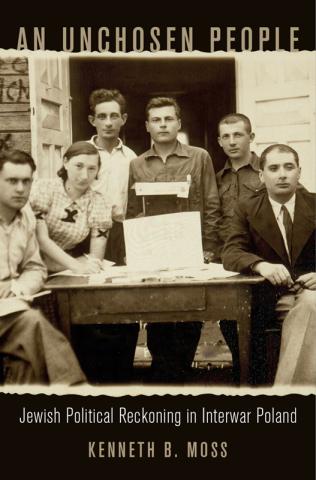Exploring a 1930s Jewish reckoning with danger and helplessness
Kenneth Moss’ latest book, An Unchosen People, traces cultural and political creativity among Polish Jews born not out of possibility and agency, but from a hard confrontation with the rising danger of right-wing politics and the community’s powerlessness to overcome it
By Sarah Steimer
The fraught history of the three million Jews who lived in Poland before the Second World War is often written today as a story of creativity and resistance, of an unbowed community not only fighting to protect its rights but imbued with the conviction that it had in its hands the power to shape its own collective destiny. A new book by Kenneth Moss, the Harriet and Ulrich E. Meyer Professor of Jewish History and the College, tells a more complicated story of how, when facing rising ethnonationalism, fascism, and antisemitism across Europe in the 1930s, many Polish Jews began to recognize that that their community was in real danger and they had very little capacity to do much about it. At most, Jewish political efforts might help a small minority of the community win a reasonable chance at a decent future.
In An Unchosen People, to be published by Harvard University Press in December, Moss traces the transformation of interwar Polish Jewish thought about the political pathologies into which modern polities can fall quickly — about the weakness of liberalism; diaspora’s vulnerability and Zionism’s promise of an alternative; and about the need for minority communities to think not only in terms of ideals and hopes, but also in terms of danger, vulnerability, relative powerlessness, and hard choices.
“This became a book about people who in some ways realized they no longer have the luxury of thinking about the identity they want, the culture they want, the ideals they wish to realize in everyday life,” Moss says. “In fact, they have to begin their political thought anew from the recognition of their community’s incredibly limited capacities to determine its own future in the face of rising danger.”
Moss’ previous book, the prize-winning Jewish Renaissance in the Russian Revolution, examined bold visions of Yiddish and Hebrew cultural renaissance in the first years of the Russian Revolution. That previous book, he acknowledges, can be read as a study in Jewish optimism about cultural possibility and agency in the diaspora. Yet as Moss researched An Unchosen People — reading Yiddish, Hebrew, and Polish diaries by young people; works of sociology and investigative journalism; the impressions of visitors from Palestine and the U.S.; poetry and fiction; and private letters — he discovered a story not of cultural resistance, social adaptation, or undimmed ideological faith, but of political reckoning.
Moss says he was concerned that Jewish historians of the era have confused their desire for a usable past with the past itself, and was driven to think about moments and ways in which Jewish history has been defined by powerlessness.
“I do think we are obliged to think about the ways in which the Diaspora Jewish experience shouldn't just be celebrated in some sort of counter-historical way, but has to be reckoned with,” he says. “In a much more modest way, I wanted to get past the whole irresolveable debate we have today ad nauseum about ‘What could people have known before the Holocaust?’ and simply to show that there were people at the time reckoning with the question of: ‘Have we overestimated the possibility of creating a viable future for ourselves in the Diaspora? Have we overestimated our own capacities to define the terms of our life?’”
Because numerous Polish Jews ended up in this place of reckoning, it struck him as a good focus of study — “even if it seems unseasonable.”
Moss says An Unchosen People rethinks Polish Jewish history prior to the Holocaust in five ways. In part, it’s a grassroots history that shows how early and how often ordinary Polish Jews began to conclude that there was little prospect of a decent future for themselves and their children in Europe. It’s also an intellectual history of Jewish sociologists, political scientists, and political psychologists who reluctantly recognized that they had to put aside cherished progressive ideas about human rationality and progress and instead seek new tools to understand the horrifying speed and intensity with which a dangerous politics of hate and fear was reshaping the world around them.
An Unchosen People is also, Moss says, a new kind of history of Zionism. After reading letters from Zionist emissaries from Palestine to Poland, he discovered that while Zionist and anti-Zionist camps faced off in a battle of ideas, many Polish Jews grew interested in Zionist efforts on more practical grounds: They were curious to learn whether a new life in Palestine might really be different, better, and available to them as individuals.
Moss offers an equally unfamiliar history of Jewish Diasporism. Instead of telling the familiar stories of revolutionaries, he instead draws attention to Diasporist activists, scholars, and poets who were driven to think about the damage that the feelings of futurelessness were doing to people’s psyches — and to explore whether art and culture could counter the damage done.
Finally, An Unchosen People digs down into the intimate discussions of friends and families to reconstruct a history of Polish Jewish ethical debate about the competing claims of communal, individual, and familial need in the face of the impossibility of finding happy solutions for all, or even most.
Moss points to the writings of one 20-year-old who left a diary and a series of critical reflections that capture a deepening critical insight into Polish Jewry’s worsening situation and a recognition that, as the young man put it, “we're just not going to find any medicine that will suffice for the whole community.” Despite the young man’s own enthusiasm for diasporic Yiddish culture, he joined the Zionist youth pioneer movement in the hopes of getting one of the limited British certificates that allowed immigration to Palestine.
“To read that was wrenching,” Moss says. “But it clarified for me what the book was really about.”
For Moss, the most important legacy of this era in Jewish history is neither feel-good stories of idealism nor a story of mere despair. Rather, he says he hopes that An Unchosen People helps recover a different kind of history of political creativity. An Unchosen People rediscovers interwar Polish Jews as culturally and politically creative not out of ease, freedom, possibility, and agency, but out of desperation in the face of vulnerability, foreclosure, and limited resources.
 THE UNIVERSITY OF CHICAGO
THE UNIVERSITY OF CHICAGO



